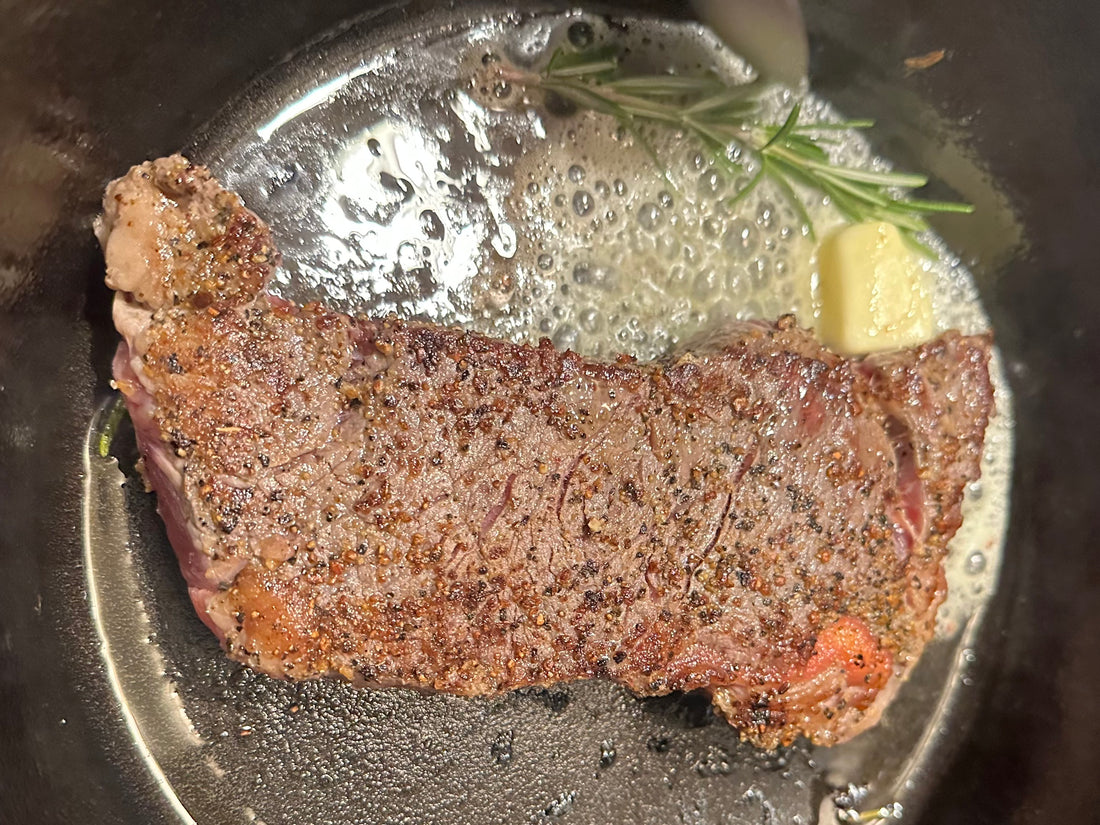As a personal trainer and nutrition specialist, I'm always on the lookout for ways to help you optimize your health and well-being. In this blog let's dive into a topic that goes beyond the gym and into the kitchen: the incredible health benefits of choosing grass-fed and finished, and pasture-raised animal products. Not only do these choices positively impact our health, but they also support the welfare of animals and local farms. It's truly a win-win situation!
Why Grass-Fed and Pasture-Raised Matter
First off, let's clarify what we mean by grass-fed and finished, and pasture-raised products. These terms refer to the way animals are raised and fed. Grass-fed and finished animals graze on grass for their entire lives, while pasture-raised animals roam freely outdoors, consuming a natural diet. This contrasts sharply with the more common practice of feeding animals grains and keeping them confined in industrial farms.
Health Benefits for You
-
Higher Nutrient Density: Grass-fed and pasture-raised meats and dairy are packed with more nutrients compared to their grain-fed counterparts. They are rich in essential omega-3 fatty acids, which are known for their anti-inflammatory properties and benefits to heart and brain health. Additionally, these products contain higher levels of vitamins A, D, and E, as well as antioxidants.
-
Better Fat Profile: The fat composition in grass-fed products is superior. They have a healthier ratio of omega-3 to omega-6 fatty acids, which is crucial for reducing inflammation in the body. This balance is often skewed in grain-fed animals, leading to higher levels of omega-6, which can promote inflammation and associated diseases.
-
Lower Risk of Antibiotic Resistance: Industrial farming often relies heavily on antibiotics to keep animals healthy in cramped, unsanitary conditions. This overuse contributes to antibiotic resistance, a growing concern for human health. Grass-fed and pasture-raised animals are generally healthier and less reliant on antibiotics.
-
Cleaner, More Natural Products: Without the addition of hormones and unnecessary antibiotics, grass-fed and pasture-raised products are cleaner and closer to what nature intended. This means fewer synthetic chemicals entering your body.
The Downside of Grain-Fed and Factory-Farmed Products
-
Nutrient Deficiencies: Grain-fed animals often have lower levels of essential nutrients. For example, their meat contains fewer omega-3 fatty acids and antioxidants, which are vital for reducing inflammation and supporting overall health.
-
Unhealthy Fats: As mentioned, grain-fed animals have a higher omega-6 to omega-3 ratio, contributing to inflammation. This imbalance is linked to numerous chronic diseases, including heart disease, diabetes, and cancer.
-
Animal Welfare Concerns: Factory farming often involves keeping animals in confined spaces, leading to stress, disease, and a lower quality of life. These conditions necessitate the use of antibiotics and hormones to maintain the health of the animals, which ultimately affects the quality of the products we consume.
-
Environmental Impact: Industrial farming practices can be detrimental to the environment, contributing to soil degradation, water pollution, and increased greenhouse gas emissions. In contrast, well-managed pasture-based systems can enhance soil health and biodiversity.
Supporting Local Farms: A Win-Win
Choosing grass-fed and pasture-raised products isn't just about our health—it's also about supporting local farmers and sustainable agriculture. When you buy these products from local farms, you:
- Promote Ethical Farming: Local farmers who raise grass-fed and pasture-raised animals often prioritize animal welfare and sustainable practices, ensuring that animals live healthier, more natural lives.
- Boost Local Economy: Supporting local farms helps to keep money within your community, creating jobs and fostering economic growth.
- Reduce Environmental Impact: Locally sourced products mean less transportation, reducing your carbon footprint and supporting environmentally friendly farming practices.
Why Quality is Worth the Investment
Now, you might be thinking: "But isn't grass-fed and pasture-raised more expensive than grain-fed options?" It's true that there can be a price difference, but let's put that into perspective.
Investing in grass-fed and pasture-raised products is an investment in your long-term health. Yes, you might pay a bit more at the checkout counter, but consider the potential savings down the road. By prioritizing nutrient-dense foods like grass-fed meats and pasture-raised dairy, you're investing in your well-being and reducing the likelihood of future medical expenses.
Think about it: the cost of treating chronic illnesses related to poor diet—such as heart disease, diabetes, and obesity—far outweighs the upfront cost of choosing higher-quality foods. Moreover, the improved nutrient profile of grass-fed and pasture-raised products can contribute to better overall health and vitality, potentially reducing your need for medical interventions in the future.
In essence, the difference in cost between grain-fed and grass-fed products pales in comparison to the invaluable benefits you gain for your health and well-being. It's not just about the dollars spent today; it's about investing in a healthier tomorrow—for you, for the animals, and for our planet.
Choose wisely, invest in your health, and reap the rewards of a vibrant life.
Making the Switch
Switching to grass-fed and pasture-raised products might seem daunting at first, but it doesn't have to be. Start by incorporating these items into your diet gradually. Look for local farmers' markets, join a community-supported agriculture (CSA) program, or seek out grocery stores that prioritize ethically sourced products.
Remember, every small step counts. By choosing grass-fed and pasture-raised products, you're making a powerful choice for your health, the welfare of animals, and the sustainability of our planet.
Let's fuel our bodies with the best nutrition possible and support a healthier, more ethical food system.

